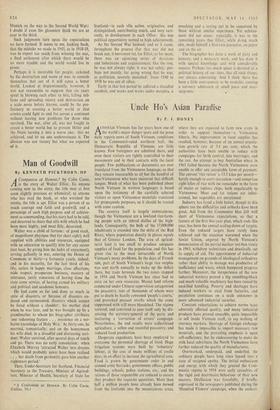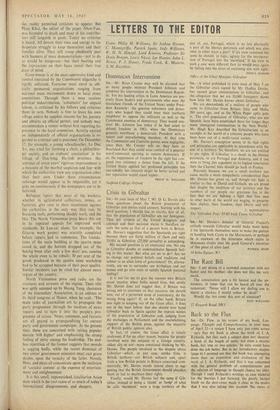Uncle Ho's Asian Paradise
By P..1. HONEY
ATHOUGH Vietnam has for years been one of the world's major danger spots and the press daily reports news of South Vietnam, conditions in the Communist-ruled northern half, the Democratic Republic of Vietnam, are little known. Few foreigners are admitted there, and even these visitors are tightly controlled in their movements and in their contacts with the local people. Few publications or documents are ever translated from the Vietnamese language, so that they remain inaccessible to all but the handful of non-Vietnamese who have mastered that difficult tongue. Much of what has been published about North Vietnam in western languages is based upon the testimony of the carefully selected visitors or upon Vietnamese materials translated for propaganda purposes, so it should be treated with some caution.
The country itself is largely mountainous, though the Vietnamese are a lowland rice-farm- ing people with an inbred dislike of the high- lands. Consequently, the bulk of the 17,000,000 inhabitants is crowded into the delta of the Red River, where population density in places equals that of Greater London. The area of agricul- tural land is too small to produce adequate supplies of food for the population, and this has given rise to the most intractable of North Vietnam's many problems. In the days of French rule, part of. South Vietnam's large rice surplus was sent north annually to make up the deficit there, but trade between the two zones stopped in 1954 and North Vietnam has since had to exist on her own resources. Maoist land reform conducted under Chinese supervision antagonised the peasantry, tens of thousands of whom were put to death by hastily convened 'people's courts,' and provoked peasant revolts which the army suppressed with still more bloodshed. The regime tottered, and contrived to save itself only by dis- missing the secretary-general of the party and instituting a 'correction of errors' campaign. Nevertheless, the end results were collectivised agriculture, a sullen and resentful peasantry, and reduced food production.
Desperate expedients have been employed to overcome the perennial shortage of food. Huge irrigation systems were built by 'voluntary' labour, at the cost of many millions of coolie days, in an effort to increase the agricultural area. Food is grown by government order in and around army barracks, government offices, public buildings, schools, police stations, etc., and the rations of those responsible are reduced to ensure they produce the requisite quantities. More than half a million people have already been moved from the lowlands into the mountainous areas, where they are expected to farm new crops in order to support themselves—a Vietnamese Siberia. No improvement in food supplies has resulted, however, because of an annual popula- tion growth rate of 3.4 per cent, which the authorities have been unable to reduce with campaigns for birth control, late marriages, and the rest. An attempt to buy Australian wheat in 1963 failed because the North Vietnamese were unable to offer any acceptable form of payment. The current 'rice ration' is 13.5 kilos per month— barely enough to avert starvation—and comprises eight kilos of rice with the remainder in the form of maize or tapioca chips, both unpalatable to Vietnamese. Meat and fat rations are infini- tesimal, but vegetables are unrationed.
Industry has fared a little better, though in this sphere too the difficulties and setbacks have been great. Aid from the Communist bloc Jell well short of Vietnamese expectations, so that a feature of the first five-year plan, which ends this year, has been the annual scaling-down of targets. Even the reduced targets have rarely been achieved and the situation worsened when the Soviet Union, angered by North Vietnam's denunciation of the partial nuclear test-ban treaty in 1963, withdrew technicians and drastically cut its supply of aid. The appointment of industrial management on grounds of ideological orthodoxy rather than ability to manage was productive of inefficiency and waste, which hampered progress further. Moreover, the inexperience of the new industrial workers proved a big stumbling-block and much valuable machinery has been ruined by unskilled handling. Poverty and shortages have induced workers to steal from factories, and peculation continues on a scale unknown in more advanced industrial societies.
Constant exhortations to achieve norms have adversely affected quality, and many industrial products have proved unusable, quite impossible to sell inside Vietnam itself, to say nothing of overseas markets. Shortage of foreign exchange has made it impossible to import necessary raw materials, and the prevailing emphasis is upon self-sufficiency, but by endeavouring to make do with local substitutes the North Vietnamese have further reduced the quality of manufactures.
Overworked, underpaid, and underfed, the ordinary people have long since lapsed into a state of resigned apathy. The initial enthusiasm and energy with which they greeted the Com- munist regime in 1954 were early casualties of the rigid and doctrinaire behaviour of their new masters. Disillusion was forcefully, if briefly, expressed in the newspapers published during the `Hundred Flowers' campaign, when the authori-
ties rashly permitted criticism to appear. But Phan Khoi, the editor' of the paper, Nhan-Van, was hounded to death and most of his contribu- tors still languish in gaols. Today no criticism is heard. All devote their time and energy to the desperate struggle to keep themselves and their families alive. They still troop obediently past with banners at mass demonstrations—not to do so would be dangerous—but their bearing and the expressions on their faces reveal their true state of mind.
Government is of the most oppressive kind and control exercised by the Communist oligarchy is rigidly enforced. Everyone must enrol in offi- cially sponsored organisations ranging from national mass movements down to local street committees. Through these a man receives political indoctrination, 'volunteers' for unpaid labour, is criticised by his fellows and criticises them in turn. Nobody is free to leave his own village unless he supplies reasons for his journey and obtains an official permit, and nobody may accommodate a visitor without first reporting his presence to the local committee. Activity carried on independently of official organisations is re- garded as criminal and is punished. On December 17, for example, a young schoolteacher, Le Duc Tri, was tried for 'forming a choir, a philanthro- pic society, and an orphans' association' in his village of Duc-long, Ha-tinh province. His sentence of seven years' rigorous imprisonment is a measure of the morbid suspicion and fear with which the authorities view any organisation other than their own. Under these circumstances sabotage would appear to be impossible, yet it goes on continuously if the newspapers are to be believed.
Refugees report that most of the workers, whether in agricultural collectives, mines, or factories, give vent to their resentment against the authorities in the only way they can, by breaking tools, performing shoddy work, and the like. The North Vietnamese press bears this out in its repeated appeals for improved work standards. In Lao-cai alone, for example, the Giao-te work project was scarcely completed before repairs had to commence. The founda- tions of the main building at the apatite mine caved in, and the bottom dropped out of the baking even after only a few days' use, causing the whole oven to be rebuilt; 30 per cent of the goods produced in the apatite mine workshop had to be scrapped because of their poor quality. Similar incidents can be cited for almost every region of the country.
North Vietnamese press and radio are the creatures and servants of the regime. Their role was aptly summed up by Hoang Tung, chairman of the Journalists' Association, in an address to its third congress at Hanoi, when he said: The main tasks of journalism are to propagate the party programme through the medium of news reports and to turn it into the people's pro- gramme of action.' News, comment, and features are all geared to propagandising for current party and government campaigns. At the present time, these are concerned with raising popular morale 'still higher' and emphasising the strong feeling of unity among the leadership. The end- less repetition of the former suggests that morale is sagging badly, while the recent dismissal of two senior government ministers must cast grave doubts upon the veracity of the latter. Novels, films, and plays all concentrate upon the inclusion of 'socialist content' at the expense of entertain- ment and enlightenment.
It is this small, impoverished, totalitarian Asian state which is the root cause of so much of today's international disagreements and dangers.



































 Previous page
Previous page